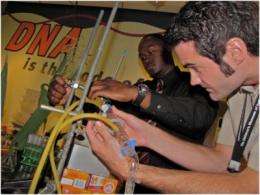Getting young scientists into the science teacher pipeline

Science is playing a significant role in today's news, including hot-button topics such as toxic waste disposal, global warming, emerging diseases and dozens of other critical concerns. Faced with these issues, there has never been a greater need for excellent science teachers who can prepare the next generation of Americans to genuinely comprehend and effectively deal with these and other scientific challenges ahead.
Producing science teachers who can keep up with rapidly advancing fields and can also inspire students is not an easy task. With a grant from the National Science Foundation's Robert Noyce Scholarship Program, the School of Science at Indiana University-Purdue University Indianapolis is challenging science majors - individuals who enjoy and appreciate science - to transfer their enthusiasm and knowledge to students in middle school and high school classrooms.
Through the Noyce Summer Internship program, freshmen and sophomore IUPUI science students spend eight weeks sharing their passion for science at places like The Children's Museum of Indianapolis and the Diabetes Youth Foundation Camp, while hopefully getting hooked on a science education career.
"This program is part of a new strategy to help overcome a real challenge related to the science teacher pipeline - helping science majors recognize their interest in science education early enough in their IUPUI experience so that they major in demanding fields like chemistry, physics or even engineering, yet still have time to take the education courses they need to be science teachers," said Kathleen Marrs, Ph.D., director of the Urban Center for the Advancement of Science, Technology, Engineering, and Mathematics Education (UCASE) and associate dean for academic affairs at the School of Science at IUPUI.
Noyce summer intern Derrick H. Andry is just the type of student Marrs is hoping will find science teaching appealing. A chemistry major at the School of Science, he is spending the summer at The Children's Museum, the world's largest children's museum, where he dons a tie-dyed lab coat and presents hands-on chemistry experiments, including one he developed during his internship to make biodiesel fuel from plant oils, to enthusiastic visitors of all ages.
"I really like chemistry and originally I planned to be a chemist, but while working as a recitation leader, which is similar to an undergrad teaching assistant, I kept having light bulb moments when I saw students finally getting it. It was then that I decided to be a high school chemistry teacher. Working in informal science education this summer at the museum has reinforced that decision," said Andry of Moorseville, Ind.
"All three Noyce Interns here at the museum this summer are curious and you can see that they have a spark for science. Without that spark, it's very hard to make science fun. They are clearly on life-long science learning paths and hopefully those paths will take them into middle school or high school classrooms as teachers and mentors," said Michele Schilten, M.S., school programs manager at The Children's Museum.
Artis Hailey of Hammond, Ind., and Abby Soltis of Des Moines, Iowa, are the two other Noyce Interns working at The Children's Museum this summer. Both are Butler University undergraduates also working for IUPUI engineering degrees through the IUPUI/Butler University Engineering Dual Degree Program.
Hailey's enthusiasm for science focuses on the technological end of the spectrum. A dual economics and computer engineering major, he already is thinking about career options and is enthusiastic about teaching technology to middle and high school students.
"There aren't very many technology teachers out there and the need to get kids to think outside the box to solve problems is great," Hailey said. "I'd like to get more kids as excited about technology as I am." As a Noyce Intern he is working in The Children's Museum's SciencePort using his aptitude for technology to design projects that intrigue a generation for whom technology is a part of everyday life. In his spare time this summer he is taking a physics course at the School of Science and preparing for football season as a linebacker on the Butler team.
Abby Soltis is a dual biology and biomedical engineering major with a math minor. "While many biology majors are enroute to nursing or medical careers, that's not for me. Biomedical engineering has taught me good problem-solving skills that will be useful in whatever I do. Teaching is about passion and I want to transfer my passion for math and science to students. It doesn't matter what kind of science or math it is, I just want to make students enthusiastic about learning.
"I am naturally inquisitive and I am about 80 percent sure I want to teach science or math. This summer as a Noyce Intern designing and demonstrating projects including one related to the physics of sound for the big Rock Stars, Cars & Guitars exhibit has convinced me that whole families can be engaged in science. The Children's Museum has been a wonderful introduction to education," she said.
Through a competitive process, IUPUI Noyce Interns can become Noyce Scholars and as juniors and seniors receive scholarship assistance as they add rigorous courses from IUPUI's School of Education to their already demanding workload. Noyce Scholars commit to two years of service as science or mathematics teachers at a high need public school anywhere in the United States.
Provided by Indiana University School of Medicine
















